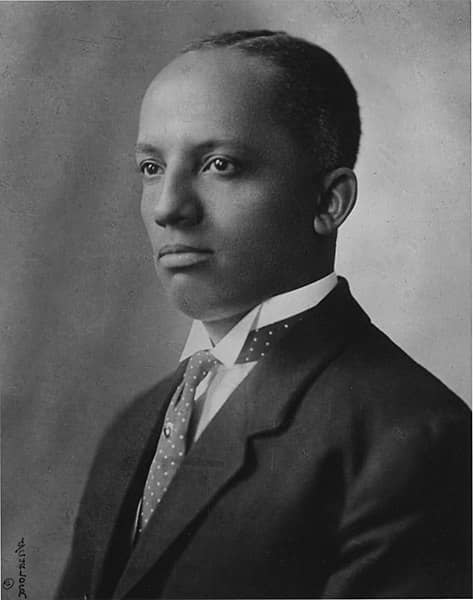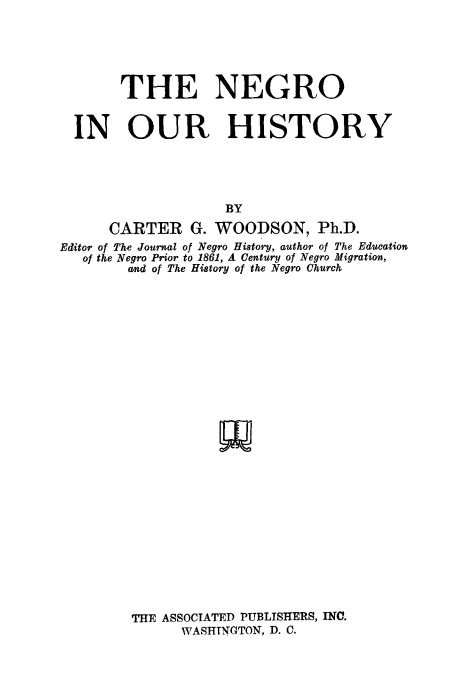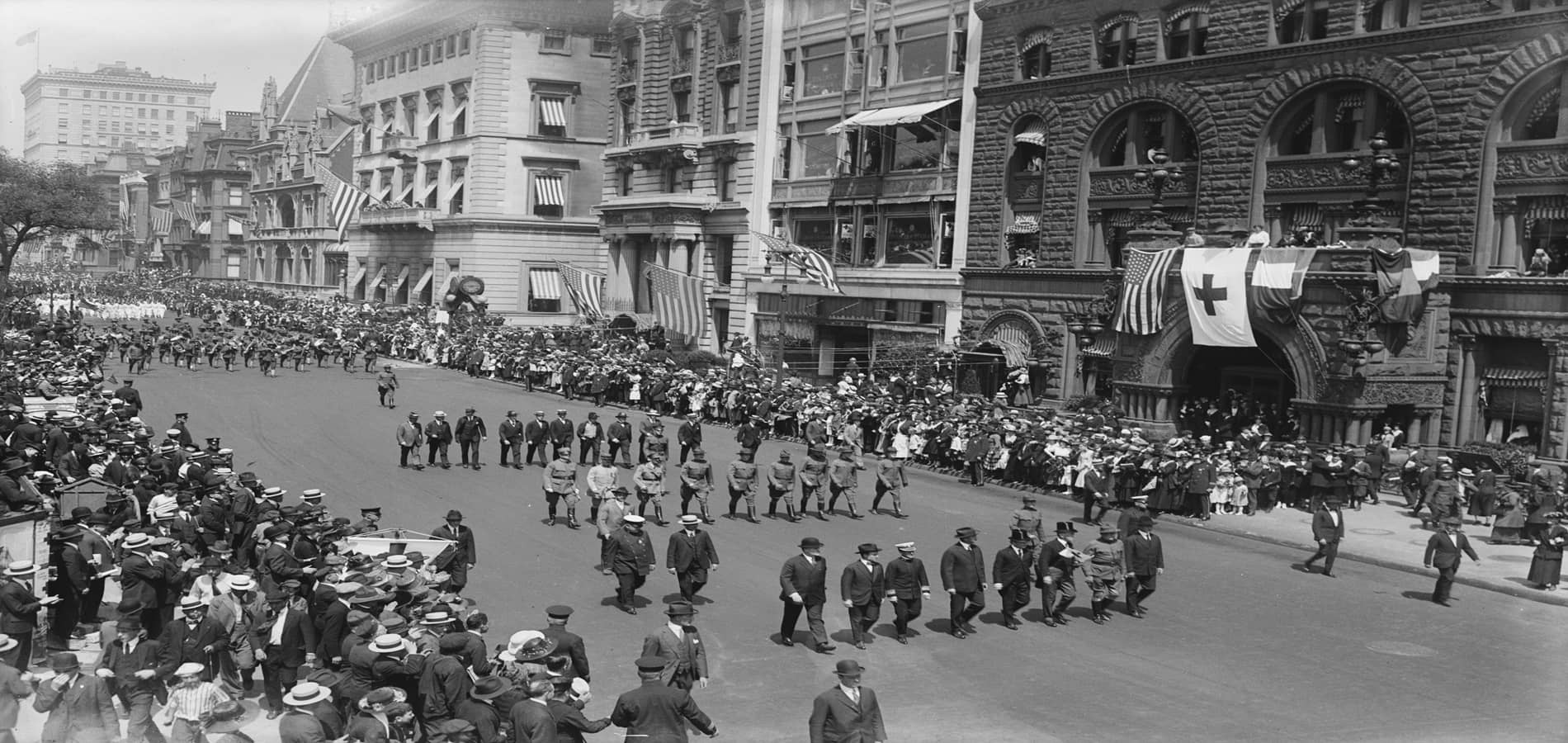While Black history should be learned and celebrated throughout the year, February is nationally designated as Black History Month—and this is thanks to a Black American historian named Carter G. Woodson. Woodson was one of the first scholars to dedicate focus to studying the African diaspora and the heritage and achievements of African Americans. Today, he is widely regarded as the “Father of Black History,” the one who championed designating time to study the rich culture of Black Americans. Establishing the first Negro History Week in 1926 to promote the teaching of Black history in schools, Woodson’s accomplishments eventually led to the creation of Black History Month in 1976.

Unlikely Beginnings
As former slaves, both of Carter Woodson’s parents were illiterate. In order to help support the family, Carter spent the majority of his childhood working, both on his family’s farm and in the harsh environments of the coal mines. He was completely self-taught until age 20, when he entered high school and was discovered to be an exceptional student, graduating with his diploma in under two years. For a while he worked as a school principal, and then he continued his studies at Berea College. After graduating with a bachelor’s degree in literature, he headed abroad, working for the U.S. government as a school superintendent in the Philippines. He continued to travel Europe and Asia before coming back to the States, where he earned a bachelor’s and master’s degree at the University of Chicago in 1908.

Eventually, in 1912, Woodson became the second Black man, after W.E.B. DuBois, to earn a doctorate at Harvard University.[1]Kara W. Swanson, Race and Selective Legal Memory: Reflections on Invention of a Slave, 120 COLUM. L. REV. 1077 (2020). This article can be found in HeinOnline’s Law Journal Library. He served as principal of Armstrong Manual Training School in Washington, D.C., and then went on to hold dean positions at Howard University and West Virginia Collegiate Institute, both of which are historically Black universities.

A Black History Advocate
Despite Woodson’s intelligence and achievements, as a Black man he was not allowed to attend conferences of the American Historical Association, of which he was a member. Justifiably, Woodson became concerned that white scholars and historians were neglecting the importance of Black history. In response, in 1915 he helped establish the Association for the Study of Negro Life and History[2]14815 6 (2003)Carter G. Woodson Home National Historic Site Establishment Act of 2003. This document can be found in HeinOnline’s Congressional Serial Set. (ASNHLH). Additionally, he launched the respected Journal of Negro History, which continues publishing today as the Journal of African American History.
However, Woodson wanted to ensure that Black history would be acknowledged and taught in schools. So, he worked with his fraternity, Omega Psi Phi, to establish Negro History and Literature Week[3]William H. Manz. Legislative Histories of the Emergency Economic Stabilization Act of 2008 and the American Recovery and Reinvestment Act (2008). This document can be found in HeinOnline’s Taxation & Economic Reform in America … Continue reading in 1920. Then, in 1926, he convinced the ASNLH to launch Negro History Week, to be acknowledged during the second week in February to coincide with the birthdays of Abraham Lincoln and Frederick Douglass.[4]George W. Bush, Remarks at the Medical College of Wisconsin in Milwaukee, Wisconsin – February 11, 2002, 2002 Pub. Papers 205 (2002). This document is located in HeinOnline’s U.S. Presidential Library. Accordingly, schools and organizations across the country honored the week, and ASNLH established branches across the country to provide educational resources.
Throughout his life, Woodson continued to advocate for the study and celebration of African American history. Before his death in 1950, he published several books, such as A Century of Negro Migration, The Education of the Negro Prior to 1861, The History of the Negro Church, Negro Makers of History,[5]Carter G. Woodson. Negro Makers of History (1928). This book is located in HeinOnline’s Slavery in America and the World database. Negro Orators and Their Orations,[6]Carter G. Woodson. Negro Orators and Their Orations (1969). This book is located in HeinOnline’s Legal Classics database. The Negro in Our History,[7]Carter G. Woodson. Negro in Our History (1922). This book is located in HeinOnline’s Slavery in America and the World database. and his acclaimed 1933 title, The Mis-Education of the Negro.

Black History Month
The first Black History Month was celebrated in 1976, when, inspired by the momentum of the civil rights movement in the 1960s, the ASNLH, now called the Association for the Study of African American History, changed Negro History Week to Black History Month,[8]William H. Manz. Legislative Histories of the Emergency Economic Stabilization Act of 2008 and the American Recovery and Reinvestment Act (2008). This document can be found in HeinOnline’s Taxation & Economic Reform in America … Continue reading to be honored throughout all of February. That same year, Gerald Ford issued a proclamation in honor of Black History Month, as has every president since then. As Ford said, we must “seize the opportunity to honor the too-often neglected accomplishments of Black Americans in every area of endeavor throughout our history.”[9]Adopted Ceremonial Resolutions, 66 D.C. Reg. 003669 (29). This document can be found in HeinOnline’s Session Law Library.
Today, February continues to be Black History Month, thanks to the efforts and determination of Carter G. Woodson, whose legacy lives on in classrooms across the country. Woodson’s Washington, D.C. home was established as a National Historic Site in 2003,[10]Carter G. Woodson Home National Historic Site Act , Public Law 108-192, 108 Congress. 117 Stat. 2873 (2003). This document can be found in HeinOnline’s Session Law Library. and today, the University of Virginia hosts the Carter G. Woodson Institute for African American Studies, while the Dr. Carter G. Woodson African American Museum resides in St. Petersburg, Florida.
Subscribe to Our Complimentary Social Justice Suite
Our Social Justice Suite, included in all HeinOnline Core subscriptions and free of charge to any interested organization, contains four databases:
- Slavery in America and the World
- Gun Regulation and Legislation in America
- Civil Rights and Social Justice
- Open Society Justice Initiative
This unique collection of databases is an ideal way to explore social justice movements, including the fight for civil rights and racial justice, throughout history. What better way to celebrate Black History Month than to learn Black history from quality primary and secondary sources that can inspire activism in your own life?
HeinOnline Sources[+]
| ↑1 | Kara W. Swanson, Race and Selective Legal Memory: Reflections on Invention of a Slave, 120 COLUM. L. REV. 1077 (2020). This article can be found in HeinOnline’s Law Journal Library. |
|---|---|
| ↑2 | 14815 6 (2003)Carter G. Woodson Home National Historic Site Establishment Act of 2003. This document can be found in HeinOnline’s Congressional Serial Set. |
| ↑3, ↑8 | William H. Manz. Legislative Histories of the Emergency Economic Stabilization Act of 2008 and the American Recovery and Reinvestment Act (2008). This document can be found in HeinOnline’s Taxation & Economic Reform in America Parts I & II database. |
| ↑4 | George W. Bush, Remarks at the Medical College of Wisconsin in Milwaukee, Wisconsin – February 11, 2002, 2002 Pub. Papers 205 (2002). This document is located in HeinOnline’s U.S. Presidential Library. |
| ↑5 | Carter G. Woodson. Negro Makers of History (1928). This book is located in HeinOnline’s Slavery in America and the World database. |
| ↑6 | Carter G. Woodson. Negro Orators and Their Orations (1969). This book is located in HeinOnline’s Legal Classics database. |
| ↑7 | Carter G. Woodson. Negro in Our History (1922). This book is located in HeinOnline’s Slavery in America and the World database. |
| ↑9 | Adopted Ceremonial Resolutions, 66 D.C. Reg. 003669 (29). This document can be found in HeinOnline’s Session Law Library. |
| ↑10 | Carter G. Woodson Home National Historic Site Act , Public Law 108-192, 108 Congress. 117 Stat. 2873 (2003). This document can be found in HeinOnline’s Session Law Library. |



